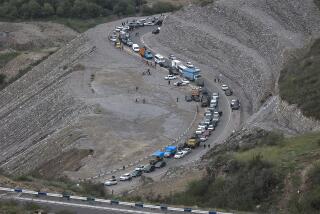Bosnia Talks Produce Agreements on Side Issues : Balkans: Moves would revive Muslim-Croat coalition, allow heating fuel to flow to region.
- Share via
WASHINGTON — In the first clear-cut results after nine days of peace talks in Ohio among warring factions from the Balkans, the Bosnian government and Croatia agreed Thursday on measures to revive their moribund federation, while Bosnia and Serbia approved a plan to increase the supply of natural gas and other heating fuel during the bitter Balkan winter.
The developments prompted U.S. Secretary of State Warren Christopher to schedule a trip to Dayton, Ohio, for today to attend the signing of the Bosnia-Croatia pact, which is intended to rebuild a 20-month-old agreement that ended fighting between those factions but never functioned the way it originally was envisioned.
The State Department said Christopher also plans a series of meetings with each delegation to nudge forward negotiations that began Nov. 1 at Wright-Patterson Air Force Base in Dayton.
State Department spokesman Nicholas Burns said Bosnian President Alija Izetbegovic and Serbian President Slobodan Milosevic approved a plan to relax the economic embargo against Serbia enough to permit shipment of natural gas, liquefied natural gas and home heating oil. In exchange, Serbia promised to assure Bosnia a share of gas flowing through a pipeline from Russia that crosses Serbia.
Although Burns insisted that the deal was reached entirely on humanitarian grounds, it would, if approved by the United Nations, mark the first easing of the economic sanctions imposed on Serbia at the start of the war in 1992. Relaxation of the embargo is at the top of Milosevic’s shopping list for the Dayton talks.
*
The two developments, although modest in themselves, are certainly good omens for the ultimate success of the negotiations. But U.S. mediators cautioned that much more bargaining would be required to settle Europe’s bloodiest war in half a century.
A senior State Department official, while declining to confirm reports that the agreement between Bosnia and Croatia already had been initialed, said that Christopher expects to participate in a public ceremony to “strengthen the federation through some very concrete procedures.”
The Muslim-led Bosnian government and then-rebel Bosnian Croats agreed in March, 1994, to form a loose federation which, in turn, would establish formal links with Croatia. The pact, signed under intense pressure from the United States, never established a functioning government, but it created an often-troubled Muslim-Croat military alliance that ended fighting between those factions and allowed them to concentrate fire on their common enemy, the Bosnian Serbs.
Under the framework plan approved last month in New York, the three warring factions agreed to divide Bosnian territory roughly in half between the Serbs and the federation. For that plan to have much chance of success, the federation must at least appear to work.
Officials said that Muslims and Croats also reached agreement on a “unifying mechanism” for Mostar, a southern Bosnia city that has been divided since 1993, when it was badly damaged in fierce fighting. Mostar’s rival Muslim and Croat mayors are in Dayton for the talks.
The deal reached by Izetbegovic and Milosevic to provide winter fuel has a two-month duration. The 1992 economic embargo against Serbia and its tiny ally republic, Montenegro, is intended to block virtually all commerce. The pact between the two presidents, endorsed by the United States and its partners in the five-nation Contact Group, calls for the U.N. Security Council to relax the embargo to permit shipments of gas and other home heating fuel to Serbia.
*
Although the embargo does not prohibit natural gas shipments to Bosnia, supplies have been frequently interrupted because the pipeline passes through Serbia and territory held by Bosnian Serbs. Burns of the State Department said the pact should make gas service to Bosnia more reliable, in part because Serbs would have less incentive to siphon off gas from the pipeline.
Burns said the agreement must be monitored by the United Nations to prevent Serbia from diverting fuel for industrial or military purposes and to make sure the Serbs do not interfere with supplies destined for Bosnia.
More to Read
Sign up for Essential California
The most important California stories and recommendations in your inbox every morning.
You may occasionally receive promotional content from the Los Angeles Times.













